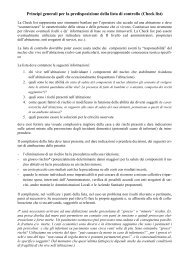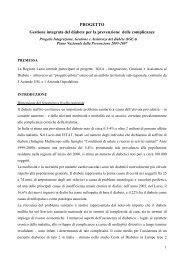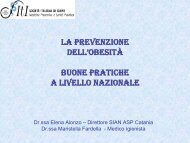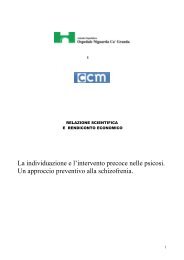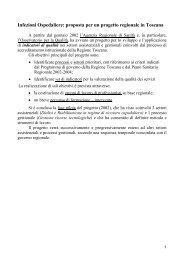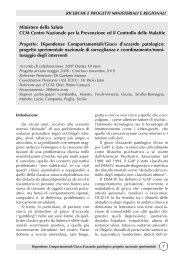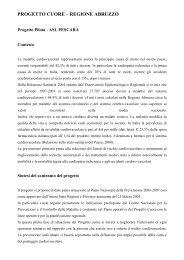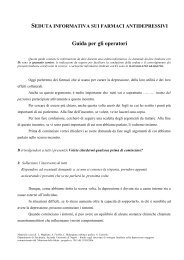Gaining health : analysis of policy development in European ...
Gaining health : analysis of policy development in European ...
Gaining health : analysis of policy development in European ...
Create successful ePaper yourself
Turn your PDF publications into a flip-book with our unique Google optimized e-Paper software.
Chapter 4<br />
88<br />
<strong>in</strong>formation was not successful, however, ow<strong>in</strong>g to a lack <strong>of</strong><br />
consensus on the l<strong>in</strong>k between television food advertis<strong>in</strong>g<br />
and obesity.<br />
Each region was asked to establish a committee on nutrition<br />
to coord<strong>in</strong>ate the implementation <strong>of</strong> the national nutrition<br />
<strong>policy</strong>, and to ensure the presence <strong>of</strong> <strong>health</strong>y nutrition<br />
<strong>in</strong> the PRSP (see section 2.5). Resources for the work <strong>of</strong><br />
the committee are ensured by the Regional Authority on<br />
Health and Social Affairs (DRASS). Moreover, the Government<br />
strongly supports cooperation among cities, to<br />
re<strong>in</strong>force local <strong>in</strong>itiatives and actions on <strong>health</strong>y nutrition.<br />
In February 2007, the M<strong>in</strong>ister <strong>of</strong> Health, together with the<br />
association <strong>of</strong> mayors <strong>in</strong> France, announced a charter <strong>of</strong><br />
cities active <strong>in</strong> the nutrition programme. The charter aims<br />
to foster the mutual responsibility <strong>of</strong> communes and the<br />
state for giv<strong>in</strong>g high priority to nutrition <strong>in</strong> the programmes<br />
<strong>of</strong> the communes. Typically, communes are <strong>in</strong>volved <strong>in</strong> improv<strong>in</strong>g<br />
the quality <strong>of</strong> food <strong>in</strong> school canteens and hospitals<br />
and creat<strong>in</strong>g greater opportunities for physical activity. In<br />
return, they are allowed to use the logo <strong>of</strong> the national<br />
programme.<br />
PNNS is <strong>of</strong>ten considered the most effective and successful<br />
public <strong>health</strong> programme In France, and among <strong>in</strong>ternational<br />
experts to be an exceptionally well-designed and<br />
well-implemented strategy. The reasons for success are<br />
various: there is strong political will for PNNS and committed<br />
leadership <strong>in</strong> the M<strong>in</strong>istry, <strong>in</strong> INSERM and <strong>in</strong> other<br />
research <strong>in</strong>stitutes; it works at <strong>in</strong>term<strong>in</strong>isterial level and has<br />
clear, coherent objectives that agree with those <strong>of</strong> current<br />
and former programmes (such as the Cancer Plan); it is<br />
based on scientific evidence and supervision; and it <strong>in</strong>volves<br />
various partners and stakeholders by creat<strong>in</strong>g a broad<br />
forum, a strong voice and a focus on the issue. Cooperation<br />
with the private sector is a key element <strong>of</strong> the programme,<br />
as the regulation <strong>of</strong> market supply is one <strong>of</strong> its ma<strong>in</strong> aims.<br />
In general, bus<strong>in</strong>esses are <strong>in</strong>terested <strong>in</strong> participat<strong>in</strong>g <strong>in</strong> the<br />
nutrition programme and thereby creat<strong>in</strong>g a positive public<br />
image. In addition, the M<strong>in</strong>istry sets out a clear framework<br />
and ethical guidel<strong>in</strong>es for cooperation and for allow<strong>in</strong>g use<br />
<strong>of</strong> the well-known PNNS logo.<br />
A challenge for PNNS is to create and ma<strong>in</strong>ta<strong>in</strong> good cooperation<br />
with other programmes. PNNS cannot and should<br />
not deal with all the nutritional problems <strong>of</strong> the French<br />
population. Experts express concerns about the susta<strong>in</strong>ability<br />
<strong>of</strong> the programme because <strong>of</strong> limited f<strong>in</strong>ancial resources<br />
and recent cut-backs that it has had to face.<br />
2.8.3. Alcohol<br />
France is world famous for its w<strong>in</strong>e production and is one<br />
<strong>of</strong> the world’s lead<strong>in</strong>g w<strong>in</strong>e exporters, as well as the third<br />
largest exporter <strong>of</strong> spirits <strong>in</strong> Europe. In terms <strong>of</strong> alcohol<br />
consumption, France is characterized as hav<strong>in</strong>g a “wet”<br />
culture, whereby daily light dr<strong>in</strong>k<strong>in</strong>g is the norm, alcohol is<br />
l<strong>in</strong>ked to meals and w<strong>in</strong>e has always been a part <strong>of</strong> everyday<br />
life.<br />
After the Second World War, alcohol consumption rose<br />
significantly and reached its peak <strong>in</strong> the 1950s. In the last 50<br />
years, per capita alcohol consumption has fallen by about<br />
40% (from 19 litres <strong>of</strong> pure alcohol per capita per year <strong>in</strong><br />
1950 to 10.5 litres <strong>in</strong> 2000) (22) because <strong>of</strong> the decl<strong>in</strong>e <strong>in</strong><br />
w<strong>in</strong>e consumption, the change <strong>in</strong> consumption patterns and<br />
the rural-to-urban shift <strong>in</strong> the population. Nevertheless, per<br />
capita alcohol consumption <strong>in</strong> France is higher than the EU<br />
average and alcohol-related harm gives cause for serious<br />
concern. A government alcohol strategy from 2001 (23)<br />
stressed that alcohol consumption is responsible for 14% <strong>of</strong><br />
total mortality among males and 3% among females, with<br />
strong regional and socioeconomic differences.<br />
Recogniz<strong>in</strong>g the relevance <strong>of</strong> alcohol-related problems <strong>in</strong><br />
France for the first time, <strong>in</strong> 1954 the Government established<br />
the High Committee for the Study <strong>of</strong> and Information<br />
on Alcoholism, charged with mak<strong>in</strong>g recommendations<br />
for <strong>policy</strong>-makers; it was <strong>in</strong>corporated <strong>in</strong>to the HCSP <strong>in</strong><br />
1991. A major result <strong>of</strong> the work <strong>of</strong> Committee was the<br />
Case studies: <strong>policy</strong> <strong>development</strong> <strong>in</strong> countries for tackl<strong>in</strong>g noncommunicable diseases



